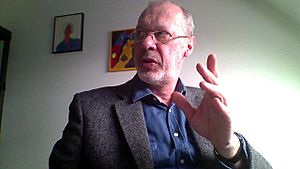Jan Blommaert facts for kids
Quick facts for kids
Jan Blommaert
|
|
|---|---|
 |
|
| Born | November 4, 1961 |
| Died | January 7, 2021 (aged 59) |
| Citizenship | Belgian |
| Alma mater | Ghent University, University of Antwerp |
| Scientific career | |
| Fields | Sociolinguistics, linguistic anthropology, discourse analysis, linguistics |
| Institutions | Tilburg University |
| Influences | Dell H. Hymes, John Gumperz, Johannes Fabian, Michael Silverstein, Pierre Bourdieu, Michel Foucault, Steven Vertovec, Émile Durkheim |
Jan Blommaert (born November 4, 1961 – died January 7, 2021) was a Belgian expert in language and culture. He was a professor of Language, Culture, and Globalization at Tilburg University in the Netherlands. He also taught at Ghent University in Belgium and the University of the Western Cape in South Africa.
Blommaert was known as one of the most important experts in Sociolinguistics and linguistic anthropology. Sociolinguistics studies how language is used in society. Linguistic anthropology looks at how language connects to culture. He helped develop ideas about how languages spread around the world. He also studied how this global spread can create new forms of unfairness and inequality.
Contents
Biography
Jan Blommaert was born in Dendermonde, Belgium. He earned his PhD from Ghent University in 1989. His studies focused on African history and languages.
After his PhD, Blommaert worked as a research director at the International Pragmatics Association. This group was based at the University of Antwerp. In 1999, he returned to Ghent University. There, he became an Associate Professor and led the Department of African Languages and Cultures.
In 2005, he became a Professor at the Institute of Education at the University of London. From 2008 to 2010, he was a Finland Distinguished Professor at the University of Jyväskylä. In 2007, he became a Professor at Tilburg University. He also directed the Babylon Center there.
Blommaert held special honorary professor titles at other universities. These included Beijing Language and Culture University and Hellenic American University. He passed away in Antwerp in January 2021, at the age of 59.
What He Studied
Jan Blommaert's work focused on understanding how power and social inequality affect language. He looked at how these issues show up in society, especially in a world that is becoming more global. He used discourse analysis and ethnography in his research. Discourse analysis studies how language is used in real-life situations. Ethnography involves studying people and cultures closely.
His main goal was to study inequality in society. He especially looked at how this inequality is connected to how people use language. Besides his academic work, Blommaert also wrote many articles in Dutch. These articles discussed social and political issues in Belgium and the Netherlands. He wrote about topics like nationalism, populism, and democracy. He also covered asylum policies and language in education.
Language and Society
Blommaert believed that as the world becomes more connected, we need to change how we understand language and society. He thought that sociolinguistics should look more at how language is used in real life. It should also study how language creates meaning and how it is connected to culture.
He pointed out that not everyone has equal access to important language resources. For example, not everyone can easily learn standard English or Dutch. This can lead to social and political unfairness. His 2008 book, Grassroots Literacy, showed examples of this. It looked at how people in Central Africa used writing in everyday, unofficial ways.
Language in a Globalized World
Starting in 2002, Blommaert began to focus on how language works in a globalized world. He felt that older ideas in sociolinguistics could not fully explain new and changing language situations. These new situations are often caused by "superdiversity".
Superdiversity means there is much more movement of people and an explosion of new technologies. This makes societies, cultures, and languages less stable and predictable. Blommaert explored these complex issues in his book Chronicles of Complexity. He argued that even seemingly "chaotic" language environments actually have their own changing order.
Ethnography in His Work
A key part of Blommaert's work was ethnography. Ethnography is a way of studying people and cultures by observing them closely. Blommaert saw ethnography as more than just a method. He saw it as a way of thinking about and observing the world.
To get a broad view, Blommaert believed we need to understand how language is used over time. He often used ideas from other thinkers like Pierre Bourdieu and Fernand Braudel. He also used Dell Hymes' idea of ethnopoetics. This is a way to analyze stories and language in patterned ways.
Blommaert, like Hymes, understood that different ways of speaking have their own important structure for the speaker. However, these patterns can be misunderstood in formal situations, like interviews with officials. Blommaert improved this method by using real-life information from Belgian asylum seekers. He then developed a practical way to use ethnopoetics.
Awards and Honours
- Ark Prize of the Free Word, 1993.
- Emile Verhaeren chair, Free University Brussels (VUB), Belgium, 2002-3.
- Finland Distinguished Professor, University of Jyväskylä, Finland, 2008-10.
- First Barbara Metzger Prize, Wenner-Gren Foundation and Current Anthropology, 2010.
See also
 In Spanish: Jan Blommaert para niños
In Spanish: Jan Blommaert para niños
 | Selma Burke |
 | Pauline Powell Burns |
 | Frederick J. Brown |
 | Robert Blackburn |

